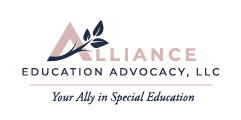Today’s blog post is Part 2 in the three-part series, Succeeding in College With Disabilities: A Student’s Guide to Accommodations. In Part 1, we discussed laws protecting college students with disabilities and common accommodations. In today’s post, we will go through the specific steps you need to take to obtain accommodations in college or university.
Differences Between High School and College
In elementary and secondary school, students have access to Special Education classes through and Individualized Education Plan (IEP). IEPs are not used in college, there are no Special Education classes, and curriculum will not be modified.
In elementary and high school, it is the IEP process that identifies and implements student accommodations. In public school, the school system has a duty to identify students with disabilities. This is not the case in college. In college, it is the student that has the responsibility to disclose the disability and seek accommodations. The school doesn’t need to do anything on its own, even if a professor thinks a student needs accommodations.
Prior to college, Parents are involved in the IEP process and must consent to services and accommodations in the student’s IEP. They attend IEP meetings at least once a year and can keep tabs on their child’s academic progress. In college, parents are not involved, and the STUDENT must self-advocate for accommodations.
How to Obtain Accommodations in College
Let’s go through the process for obtaining accommodations. Every school has its own procedures, but most generally follow a similar process.
1. Contact the Disability Services Office.
Find out which office on campus provides accommodations. Every campus has one. It may be called the Disability Services Office, Disability Support Services, Office of Student Accommodations, Student Disability Access Center, Office of Educational Accessibility, or something similar. Information should be easy to find online, but you may need to call the office.
Students requesting accommodations must disclose their disability to the college. With few exceptions (like efforts to correct past discrimination or voluntary action to overcome prior limited participation of students with disabilities), colleges may not make pre-admission inquiries as to whether the applicant has a disability. Students requesting accommodations must be specific about the accommodations they need because of their disability. It is not enough to say you have “learning disabilities” and expect the college to help you. You need to specifically name your disability (e.g., dyslexia, auditory processing disorder, adhd, etc.)
2. Gather Documentation Supporting Your Disability.
Once you find out which office on campus provides accommodations, find out what type of documentation is required, what steps to take to get accommodation, and the forms you need to complete. Students need to provide documentation that establishes that they have a disability and that they need the accommodations requested. Some examples of documentation include a letter or report from the diagnosing professional and IEP documentation (although not generally enough on their own). The documentation should state your diagnosis, the tests and methods used in the diagnostic process, how the impairment impacts you, and specific accommodations you require.
3. Meet with the Disability Coordinator.
Once you have completed the required forms and submitted your documentation, you typically have a meeting with the Disability Coordinator to review your information and request accommodations. The Disability Office will likely schedule the meeting, but you may need to reach out to them to set it up, so be proactive. During the meeting, the student will generally need to explain why he needs the specific accommodations requested. He will need to be able to explain how his disability affects him in school and how the requested accommodations help level the playing field. The Coordinator will authorize (or deny) accommodations based on your documentation and your meeting. The process can take up to six weeks, so start early.
4. Provide Accommodation Letters to Professors.
Once your accommodations are approved, the Disability Office will give you letters authorizing accommodations for you to give to your professors. The letters will not specify your disability, only the accommodations you are to receive. Note: Accommodations are not retroactive and only begin at the time you present your accommodation letter to the professor.
Dealing with a Late Diagnosis
What if you don’t find out you have a learning disability until college? The requirements to obtain accommodations are generally the same; however, a late diagnosis of learning disabilities may be questioned more than an early diagnosis. Thus, it will be especially important to have your disability well-documented, including an explanation of why the disability was not discovered earlier.
College Discipline
In elementary and high school, IDEA shields students whose behavior is disability-related and requires the school to go through a particular disciplinary process before dismissing a student for misconduct (e.g., Manifestation Determination). In elementary and secondary school, students with disabilities won’t be dismissed from public school for failure to meet academic requirements stemming from their disability. College students, however, are not shielded from discipline simply because they are able to show their behavior is related to their disability. College students with disabilities may be placed on probation or dismissed for failure to meet grade or other academic requirements.
The bottom line is a student’s disability will not shield him from college discipline or dismissal. Students who violate criminal law or a college’s code of conduct may be disciplined by college officials. Colleges must comply with Section 504 and ADA, sufficiently document a student’s wrongdoing, and provide appropriate due process. Assuming the appropriate procedures are followed, it is unlikely that a disciplinary decision will be overturned by the courts.
So what do you do if you believe your college has discriminated against you? Your legal recourse is filing a lawsuit alleging violations of The Rehabilitation Act or the ADA. However, I don’t recommend running out and filing a lawsuit. You are generally better off going through the college’s grievance process first. If you do need to file a lawsuit, you will need to prove you are academically qualified for your selected program. You will also need to show the college knew of the student’s disability and failed to accommodate or provided inadequate accommodation. As always, you must provide PROOF of the violation. Allegations or inferences, alone, are not sufficient.
Don’t miss Part 3 of our series, where we will discuss preparing your student for college and the importance of self-advocacy.
Never miss a blog post. Sign up for the Newsletter!

